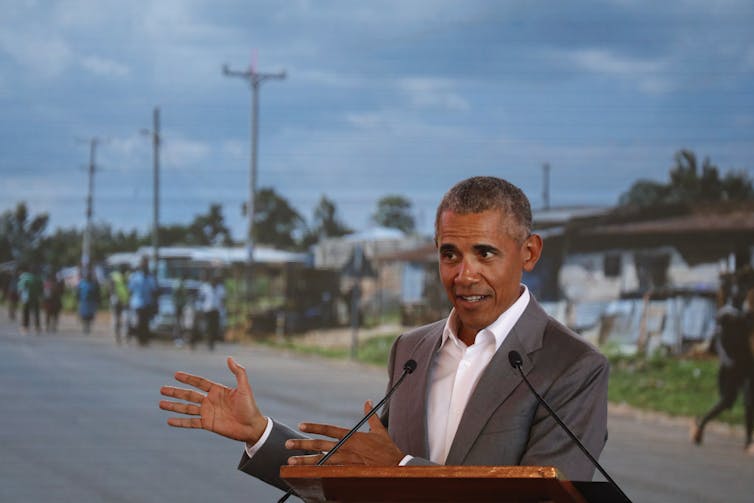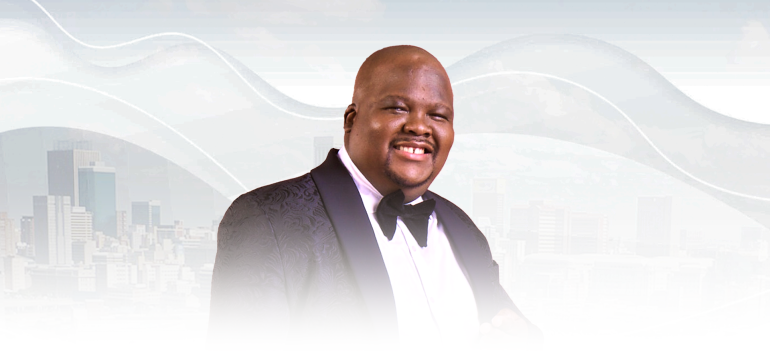Obama and active citizenship: why his Mandela address matters
By: Aaron X. Smith, Temple University

Dai Kurokawa/EPA
Former US President Barack Obama’s Nelson Mandela Annual lecture in honour of the centennial commemoration of Mandela’s birth is slated to be his most consequential address since leaving office in January 2017. The title of the address is billed as, “Renewing the Mandela Legacy and Promoting Active Citizenship in a Changing World”.
Given the state of leadership in the world, and the subject matter he’s chosen, the address is expected to be far more than just another political speech.
As we know, speeches can be much more than just an oral presentation. The timing, theme and energetic thrust of a political speech, if delivered through the spirit of a capable presenter, can have a major impact. It can alter international policy. Think here of Martin Luther King, Jr’s “I Have a Dream” speech at the March on Washington for Jobs and Freedom on August 28, 1963. A speech can also promote and unleash international intolerance. Here Adolf Hitler’s speech at Munich on July 28, 1922 comes to mind.
This rhetorical reality requires something important from the speaker. To make history, define the present, and help shape the future with their words they need to be able to understand their personal and representational place in time and space.
My research for the past 11 years has yielded significant evidence that Obama is considerably capable of meeting the standards of a formidable public speaker. His rhetorical flexibility can be viewed as he seamlessly transitioned from a humorous monologue at the annual White House correspondence dinner into a serious display of gratitude for the men and women in journalism as he closed his address. Or, his ability to pivot into serious campaign fundraiser rhetoric shortly after crooning some classic Al Greene song.
There’s particular anticipation for the Johannesburg speech because it’s the first time he’s delivering a major address without the constraints of the title of president. The 2018 Nelson Mandela Annual Lecture therefore marks the first time many people will get the opportunity to witness Obama speaking, sans any current political position or known political aspirations.
My Obama story
My interest in the power and potential of Obama’s rhetoric is both personal and professional. I have been studying and writing about his speeches for over a decade, convinced that his voice is one of the most important of our generation.
My initial analysis of Obama’s rhetorical capabilities led to a doctoral dissertation titled, “Black Skin, White House, the rhetoric and symbolism of the first African American President of the United States”.
In this text I explained:
I chose to examine the phenomena surrounding Obama’s rhetoric because he was and is a person of international consequence, his political prominence nationally is arguably unparalleled, and he is widely heralded for his effective rhetorical capabilities.
Obama, like few other historical figures, has successfully separated time with his achievement of becoming the first African American President of the United States. This glass ceiling cannot be reconstructed and shattered again. There will forever be the era before Obama and the periods that follow.
Only time will tell how significantly the Obama presidency changed history. Most peculiar perhaps will be the shifting political perceptions of those who elected Obama as part of their first presidential voting experience. There are also millions of young people throughout the world who have been impacted by the iconography of black family excellence which the Obama’s consistently exuded with poise, depth and intelligence.
In the proverbial pantheon of great orators, I believe that he is just one tier below the greatest rhetoricians on record. For example, Reverend King and Mandela are top tier speakers, then Obama is on the level just below these historic communicators.
Africa’s future
Obama is making his speech in a changing world dominated by the often outrageous utterances of his successor, US President Donald Trump. Few recent political changes have garnered the level of attention as the seemingly stark contrast between Obama and Trump.
People throughout the world may be eagerly awaiting Obama’s perspective on American politics today. That’s of course whether or not he will address the incumbent directly.
The ripple effect of American political engagement continues to have global impacts. The current international political climate has created an increased hunger for a sincere and tangible revival of the legacy of activism in pursuit of justice. This need comes tempered with a genuine appreciation for peace and reconciliation which Mandela so powerfully embodied.
It’s also significant that Obama will deliver the lecture on African soil. Africa is the home of Obama’s deceased father whose impact was described in the former president’s powerful memoir titled, “Dreams from My Father: A Story of Race and Inheritance”.
The visit to South Africa will mark Obama’s continued efforts to live out those dreams while also endeavouring to realise the dreams of Mandela.
Not only is this likely to feature Obama’s lecture, but we are likely to be introduced to the next phase of Obama’s leadership.
Pessimists may doubt the potential positive effects of inspirational rhetoric. They may also be sceptical of the power of the Nelson Mandela Foundation to encourage greater global reconciliation and positive political engagement in the tradition of the foundation’s namesake. To them I humbly submit that they pay close attention to Obama’s address.
I also urge them to remember Mandela’s words when he walked out a free man on 11 February 1990, after 27 years locked up in apartheid’s prisons. He cited our obligation to future generations to speak and act boldly:
We have waited too long for our freedom. We can no longer wait. Now is the time to intensify the struggle on all fronts. To relax our efforts now would be a mistake which generations to come will not be able to forgive.
Aaron X. Smith, Assistant Professor of Africology and African American Studies, Temple University
This article was originally published on The Conversation. Read the original article.
Written by: Natasha
Similar posts
MORE ARTICLES

In Pictures: Mzansi Celebs serve style and drama at Durban July 2025

Five killed in KZN crash allegedly caused by Polo driver

From Benin to the world: Kidjo makes history as first black African on Hollywood Walk of Fame

Drama, cheating and Surprise guest: RHOD reunion delivers shocking revelations

Why Waterfall Estate’s 99-year lease is practically forever
QUICK LINKS
UpComing Shows

On the Beat
On the Beat with George Manyosi on Kaya 959. Saturday's, 18pm-21pm.
close
Touch of Soul
With T Bose
Kaya 959 takes back Sundays with A Touch of Soul, the only show bringing you soul and RnB music that touches your mind, body and spirit. The Best T in the City, T-bose takes you back to a time when music was made to last. A Touch of Soul is the perfect wind-down to your weekend. Sundays 14h00 to 18h00.
close
The Jazz Standard
with Brenda Sisane
The Jazz Standard with Brenda Sisane. Sunday's 12:00-15:00.
close
Spade of Hearts
With Xola Dlwati
WITH XOLA DLWATI: SATURDAYS 12:00 -15:00 Spade of Hearts is a fuse of love and soulful sounds, pulling at your heartstrings. Tune in for songs that will take you down memory lane. It is the sound that once dominated your playlist. It airs Sundays 12:00 – 15:00.
close
The World Show
With Nicky B
The World Show is informative, expansive, and largely pan-African. This is a musical journey that bridges generations and genres, travelling across continents and timelines, with in-depth interviews and features. ‘The World Show’ is a four-hour global journey through sound – featuring the freshest tracks from home and afar.
close
959 Music Weekdays
Kaya 959 Hits
Real. Familiar. Memorable. Kaya 959 brings you the music you know and love from our playlist. Uninterrupted. Thursdays 20h00 to 21h00
closeConnect with Kaya 959
DownLoad Our Mobile App
© 2025 Kaya 959 | On The Street On The Air








